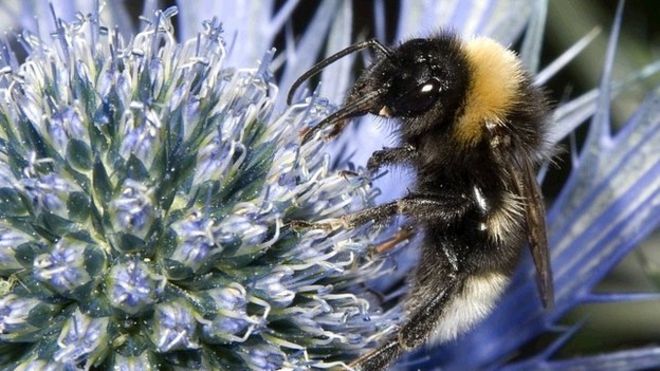Science & Environment
Ban lifted on controversial 'neonic' pesticide

The government has temporarily lifted a ban on neonicotinoid pesticides in certain parts of the country.
An EU-wide moratorium was put in place after some studies showed the pesticide caused significant harm to bees.
But following a second emergency application by the National Farmers Union, two neonicotinoid pesticides can now be used for 120 days on about 5% of England's oilseed rape crop.
Environmental and wildlife groups have called the decision "scandalous".
The areas where farmers will be allowed to use neonicotinoids has not yet been decided. According to the NFU, it will be those areas where there are records over the last season or so that the pests - primarily the cabbage stem flea beetle - have inflicted most damage on oilseed rape crops.
Farming Minister George Eustace MP told BBC's Farming Today that it was "predominantly farmers in Suffolk" who would now be able to use neonicotinoids. He said that the government was approaching the issue "with an open mind" and that there was "a lot of ambiguity" about the evidence.
The temporary relaxation of the ban will cover an area of about 30,000 hectares.
This is the second time that the NFU has applied to the Chemicals Regulation Directorate (CRD). The first application was rejected on the basis that it was not limited enough.
'Too late'
The NFU has welcomed the decision, but argues that it will come too late for many farmers.
Dr Chris Hartfield from the NFU said: "It is very nip and tuck. There is a lead time involved for the farmer. They will have to get hold of the seed, have to treat it, and have to apply it. For some it will come too late. For others, they fall outside the area, which is mainly in the east of England."
Two products from Bayer and Syngenta will be allowed to help protect crops from the flea beetle.
Bees and other pollinators are vital for the majority crops but are in decline due to habitat loss, the use of pesticides, and disease.
Friends of the Earth campaigner Paul de Zylva said: "It's scandalous that the government has caved in to NFU pressure and given permission for some farmers to use banned pesticides that have been shown to harm our precious bees.
"Ever more scientific evidence shows just how dangerous these chemicals are to bees and other pollinators - they should have no place in our fields and gardens."
The group argues that the decision-making process has not been transparent.
"It is completely unacceptable for the government to refuse to make the NFU's decision publicly available - and even asked its own independent advisors not to publish the minutes and agenda of key meetings."
'Evidence-based legislation'
Dr Hartfield from the NFU countered the suggestion that neonicotinoids have been shown to harm bees: "The majority of the research that has fuelled this debate has been based on artificial dosing studies. The big question in this area is, does this accurately reflect what happens to bees foraging in and around neonicotinoid crops?
"We don't know, but the field studies haven't shown that they are causing population declines in pollinators."
A Defra spokesperson said: "We have fully applied the precautionary ban on the use of neonicotinoids introduced by the EU, and we make decisions on pesticides based on the science only once the regulators are satisfied they are safe to people and the environment.
"Based on the evidence, we have followed the advice of the UK Expert Committee on Pesticides and our chief scientist that a limited emergency authorisation of two pesticides requested by farmers should be granted in areas where oilseed rape crops are at greatest risk of pest damage."
Dr Lynn Dicks, a biodiversity and ecosystem services research fellow at the University of Cambridge, told the Science Media Centre: "We now have robust evidence that neonicotinoids have a serious impact on free-living bumblebee colonies in real farmed landscapes.
"The Bayer ingredient allowed under this derogation - clothianidin - is the one tested in the recent study. It showed that bumblebees in landscapes with treated oilseed rape produced only a third as many queens as those in landscapes treated with other insecticide sprays, but not neonicotinoid.
"On this basis, areas with 5% of the UK's rape crop might expect to lose two-thirds of their wild bumblebee queens going into the winter of 2016/17 because of this decision. I would like to ask the two companies who gain from this decision - Bayer and Syngenta - to pay scientists to monitor the impacts on wild bumblebees and solitary bees, in comparison with areas that remain under the ban."
The two-year ban comes to an end in December.
No comments:
Post a Comment